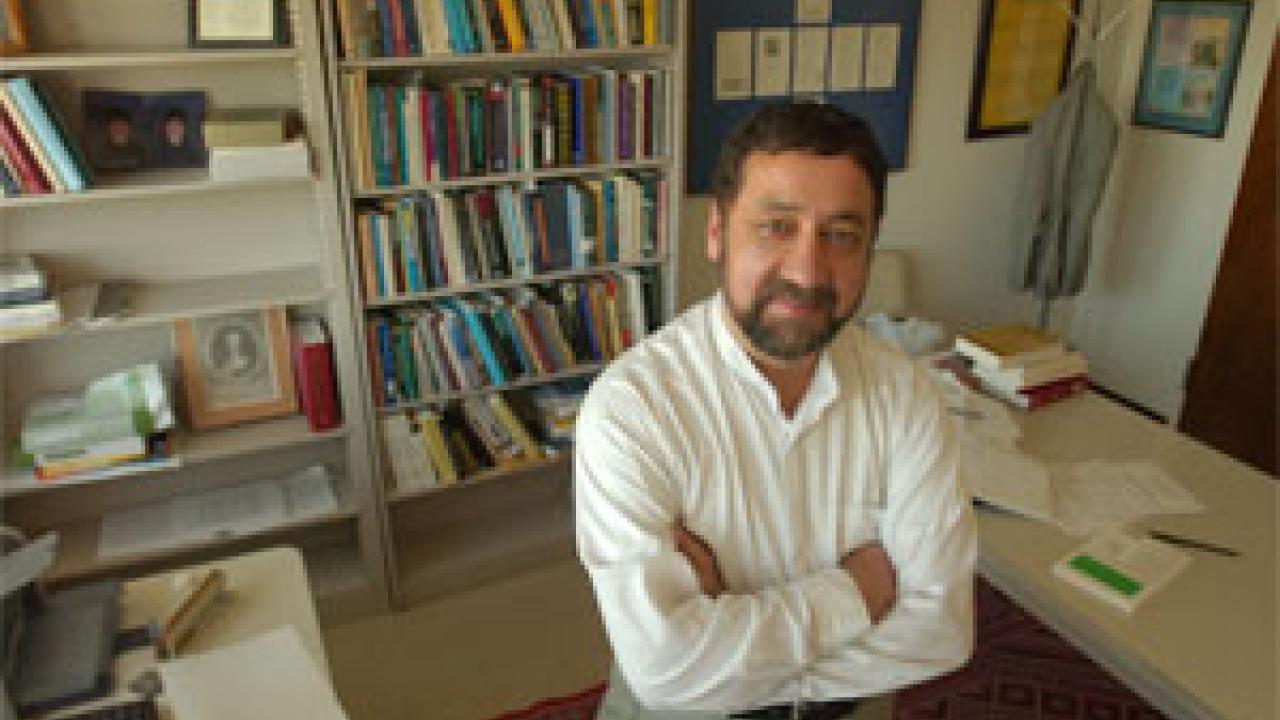Muslim students and faculty at UC Davis are finding an opportunity to chip away at the barriers between Islam and the Western world.
"It is very accepting here," says Tariq Yusufzai, a fourth-year student majoring in the biological sciences. "The people here are smart and not one-dimensional about issues like religion."
While no figures exist for the number of Muslim students, faculty or staff at UC Davis, Islam is the second-largest religion in the world with more than one billion believers by most accounts. Since 9/11, the issue has arisen as to how well they are assimilating into Western society, from cities to college campuses.
Baki Tezcan, an assistant professor of history and religious studies, says that the campus is accommodating to Muslim faculty and students and is a respectful place for mixing religions.
"Some of our world leaders would rather have us all at each other's throats," says Tezcan, who specializes in Islam and the Middle East. "But on this campus people are willing to talk seriously about important issues."
Muslims like Tezcan and Yusufzai have places on campus to pray — it is hard to leave campus five times a day. In the Shields Library basement, a place exists for Muslim students to register their devotions. "Hardly anyone knows about it," Yusufzai says. "You just need a clean place to pray."
Campus Muslims also gather at the Islamic Center of Davis on Russell Boulevard, where tradition dictates that they sit shoeless on the carpet for prayer sessions. Later this year, the ranch-style facility will undergo a major remodeling that will include distinctive Islamic architectural elements, like spiraling minarets with onion-shaped crowns.
Yusufzai is a member of the Muslim Students Association at UC Davis, a group raising awareness about the Islamic faith on campus. Activities include "halaqas" or study circles, fundraising, listserves, message boards, events, and speakers. For example, during the run-up to the War in Iraq, the Muslim Student Association was one of the most vocal opponents to U.S. military action.
It is not always easy speaking out, says Yusufzai. He acknowledges that fellow Muslim students hear an "occasional, random insult" about their religion from other students. "The females sometimes endure comments" about their veils and head wear, he says, but it is the exception rather than the rule on campus.
Yusufzai calls Islam a religion of peace. "It is divisive what we see in the media. Indiscriminate violence has no role. These (terrorists) are motivated more by their own personal circumstances than a true understanding of Islam."
Learning about Islam
Studying and teaching Islam is what brought Ahmad Iravani to campus this summer. An Islamic studies professor at the Catholic University of America in Washington, D.C., Iravani led the UC Davis class Introduction to Islam. He estimates that about two-thirds of his 20 students are non-Muslim.
"This gives young people the opportunity to learn about Islam on a factual, scientific basis, rather than relying upon what they hear from family or find in the media," he says. "Since Sept. 11, everyone wants to learn about Islam, especially the young people."
Iravani's visit represents an effort to invite outside scholars to visit campus as part of the Middle East/South Asia Studies Program, founded in 2004. Visitors have included Egyptian sociologist Saad Eddin Ibrahim, who was jailed for challenging the Mubarik regime, and his wife, Barbara Ibrahim, also a sociologist.
Besides Tezcan, other scholars hired by the Middle East/South Asia Studies Program include literature scholar Jocelyn Sharlet, British colonial historian Sudipta Sen, intellectual historian Omnia El Shakry and political scientist Zeev Maoz. The campus is offering a major in Middle East/South Asia studies.
In particular, Iravani says, the program hopes to attract faculty and students desiring to learn about the humanities and arts. The numbers of Muslim scholars in the sciences, he notes, has always been high.
The challenge, Iravani notes, is that Islam is "not clear" to non-Muslims. And for Muslims, classes like this help them reconnect with their culture and tradition. "It is not monolithic," he says, "but instead has many different interpretations and strains of beliefs and practices. The majority of Muslims are peaceful and not happy about what is happening in the news."
Iravani cautions against extremism in both the religious and secular spheres, and advocates for more equal rights and treatment for women in Islamic countries.
"All human beings are equal under God," says Iravani, who describes himself as a seeker of tolerance and an Islamic moderate.
"It is urgent that people, either non-Muslims or Muslims, realize the true essence of Islam. That way, peace will come to the world and all its religions."
Tezcan said there is no reason that cultures and religions cannot disagree and yet live together. "It has been done in the past, and it must be attempted even more vigorously in the future."
Media Resources
Clifton B. Parker, Dateline, (530) 752-1932, cparker@ucdavis.edu
